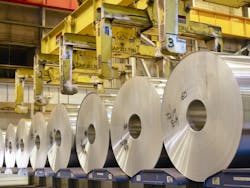Novelis Signs PPA to Power Aluminum Manufacturing Sites with Wind and Solar Energy
Novelis, an aluminum solutions provider, has signed a 10-year power purchase agreement (PPA) with Europe's Statkraft for around 58 GWh of renewable electricity per year from German wind and solar installations.
The PPA will cover up to 40% of the electricity used at two of Novelis' manufacturing plants in Germany, Nachterstedt Recycling and Nachterstedt Rolling, which corresponds to around 16% of the company's total German electricity consumption.
Once active in March 2024, the PPA will decrease carbon emissions from Novelis' electricity consumption by more than 17,000 t CO2e per year and 170,000 t CO2e in total.
Novelis aims to reduce its carbon footprint by 30% by 2026 and reach carbon neutrality by 2050 or sooner.
"Enabling our plants to power a significant part of their production with renewable electricity while decreasing carbon emissions and preserving natural resources is a perfect match to our Novelis purpose and brings us an important step forward on our sustainability journey," said Emilio Braghi, Executive Vice President of Novelis Inc. and President of Novelis Europe.
About the Author
EnergyTech Staff
Rod Walton is senior editor for EnergyTech.com. He has spent 17 years covering the energy industry as a newspaper and trade journalist.
Walton formerly was energy writer and business editor at the Tulsa World. Later, he spent six years covering the electricity power sector for Pennwell and Clarion Events. He joined Endeavor and EnergyTech in November 2021.
He can be reached at [email protected].
EnergyTech is focused on the mission critical and large-scale energy users and their sustainability and resiliency goals. These include the commercial and industrial sectors, as well as the military, universities, data centers and microgrids.
Many large-scale energy users such as Fortune 500 companies, and mission-critical users such as military bases, universities, healthcare facilities, public safety and data centers, shifting their energy priorities to reach net-zero carbon goals within the coming decades. These include plans for renewable energy power purchase agreements, but also on-site resiliency projects such as microgrids, combined heat and power, rooftop solar, energy storage, digitalization and building efficiency upgrades.
